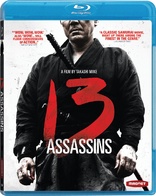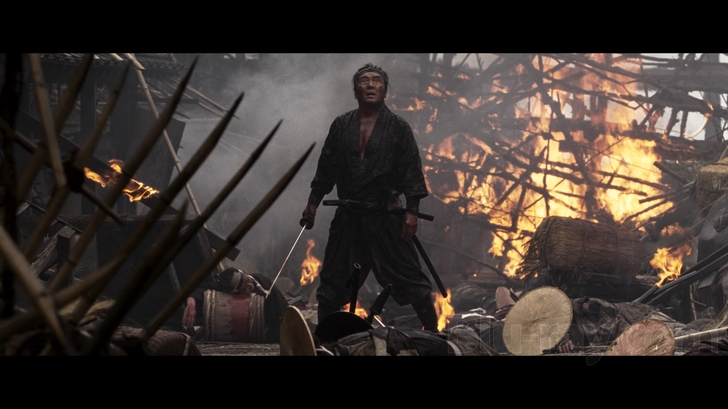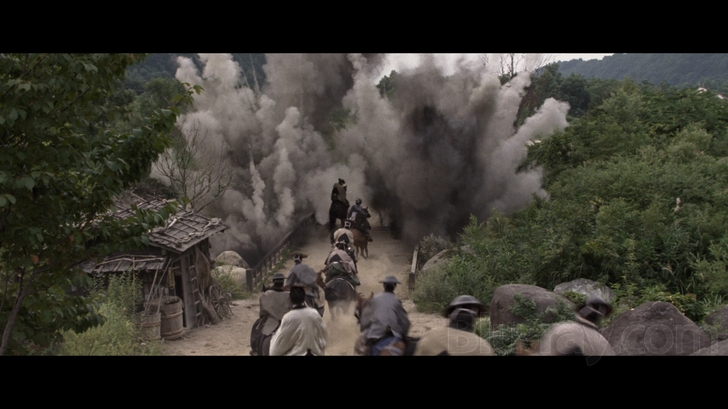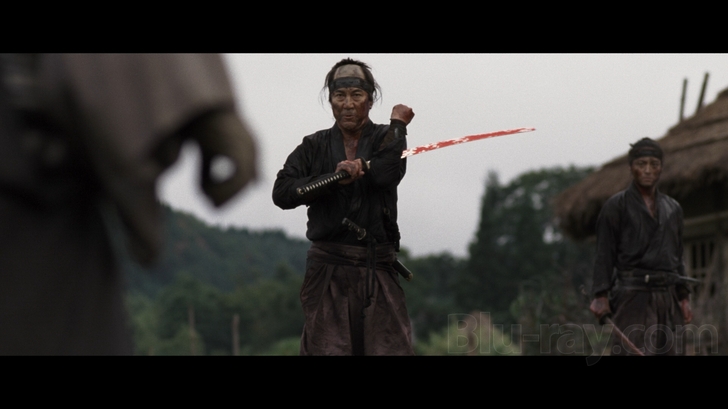13 Assassins Blu-ray Movie
Home13 Assassins Blu-ray Movie 
Jûsan-nin no shikaku / Blu-ray + Digital CopyMagnolia Pictures | 2010 | 125 min | Rated R | Jul 05, 2011

Movie rating
8 | / 10 |
Blu-ray rating
| Users | 4.2 | |
| Reviewer | 4.0 | |
| Overall | 4.0 |
Overview
13 Assassins (2010)
At the end of Japan's feudal era, a group of unemployed samurai are enlisted to bring down a sadistic lord and prevent him from ascending to the throne and plunging the country into a war-torn future.
Starring: Koji Yakusho, Takayuki Yamada, Yûsuke Iseya, Sôsuke Takaoka, Hiroki MatsukataDirector: Takashi Miike
| Foreign | Uncertain |
| Martial arts | Uncertain |
| Drama | Uncertain |
| History | Uncertain |
| Adventure | Uncertain |
| Action | Uncertain |
Specifications
Video
Video codec: MPEG-4 AVC
Video resolution: 1080p
Aspect ratio: 2.40:1
Original aspect ratio: 2.39:1
Audio
Japanese: DTS-HD Master Audio 5.1 (48kHz, 24-bit)
English: DTS-HD Master Audio 5.1 (48kHz, 24-bit)
Subtitles
English, English SDH, Spanish
Discs
50GB Blu-ray Disc
Single disc (1 BD)
Digital copy (as download)
BD-Live
Packaging
Slipcover in original pressing
Playback
Region A (locked)
Review
Rating summary
| Movie | 4.0 | |
| Video | 4.0 | |
| Audio | 4.5 | |
| Extras | 2.0 | |
| Overall | 4.0 |
13 Assassins Blu-ray Movie Review
An early contender for the most intense action/drama of the year.
Reviewed by Casey Broadwater June 29, 2011The only thing you can expect when going into a Takashi Miike film is the unexpected. The über-prolific Japanese auteur has helmed over 70 theatrical features, TV shows, and straight-to-video offerings since 1991—that’s 3.5 outings a year, including the span between 2001 and 2002, during which he made a baker’s dozen worth of films—and he’s dabbled in just about every genre, from westerns (Sukiyaki Western Django) and kid movies (The Great Yokai War) to yakuza epics (Dead or Alive) and my personal favorite, the nutso zombie-musical-claymation-family drama/comedy Happiness of the Katakuris. Of course, he’s best known for pushing the boundaries of extreme cinema in the ultraviolent Ichi the Killer, the sadistic Audition, and, most explicitly, in the taboo-busting Visitor Q, which voyeuristically revels in incest, necrophilia, and “lactation sex.” Miike frequently courts controversy, and this makes it doubly unexpected that his latest film is so comparatively traditional. A remake of a 1963 film of the same name, 13 Assassins fits neatly into the classic samurai movie mold. Instead of overturning the genre—as his reputation would suggest—Miike has simply reinvigorated it, to great effect. If films like Seven Samurai, Sword of Doom, and The 47 Ronin are your particular cup of green tea, 13 Assassins will go down just as easy.

8 of 13 Assassins
Like most samurai epics, the film’s first act bulges with exposition—setting up the political situation—and while you might have a hard time initially keeping track of who’s who as you’re introduced to several key players in quick succession, the relationships and rivalries are clarified over time. (Don’t get too hung up on it if the subtitles whiz by too fast.) The film begins in 1844, as Akashi clan elder Zusho Mamiya commits slow, brutally painful seppuku in front of a large estate. The ritual suicide is a protest against the shogun’s younger brother, Naritsugu (Gorô Inagaki), a cruel, bellicose feudal lord whose rapid ascent to power threatens to disrupt the country’s longstanding peace. Sir Doi (Mikijiro Hira), a top shogun official, can’t conscionably allow Naritsugu to assume leadership—he knows this would be disastrous for everyone—so he arranges a secret meeting with a semi-retired mid-level samurai, Shinzaemon (the excellent Koji Yakusho, of Shall We Dance), to present evidence of Naritsugu’s crimes.
Miike establishes right off the bat how casually callous Naritsugu is, showing us a flashback where the evil heir rapes another lord’s daughter-in-law and then hacks off the terrified woman’s husband’s head. Naritsugu is psychotic and remorseless—his sadism comes from boredom and privilege— and Inagaki, a member of the boy band SMAP, plays him with an emotionless expression that’s genuinely terrifying. This is a guy who takes no real joy in his heinous actions; he does them simply because he can. Nothing excites him. The real kicker is when Sir Doi introduces Shinzaemon to an armless, legless, tongueless woman that Naritsugu disfigured and took to Edo as his personal sexual plaything. When asked what kind of retribution she’d like to see handed down on Naritsugu, the naked woman—bleeding from her eyes—holds a calligraphy brush between her teeth and writes “total massacre” on a sheet of parchment.
It’s an unnerving scene—of the few distinctly “Miike” moments in the film—but it gets even stranger when the stoic Shinzaemon suddenly breaks into a grin, shaking with excitement. Then we realize: this is the moment he’s been waiting for his entire life. As a samurai during peacetime, he’s done nothing of consequence, and this is his chance to die “a noble death” in the service of a greater cause. Tasked with assassinating Naritsugu, Shinzaemon assembles an elite unit of eleven other samurai—including his wayward nephew, Shinrokuro (Takayuki Yamada), veteran warrior Saheita (Hiroki Matsukata), badass ronin Kujuro (Tsuyoshi Ihara), and the spear-wielding Heizo (Arata Furuta), who’s old enough to remember the times of war—and together they conspire to ambush Naritsugu’s entourage at the mountain pass town of Ochiai. On the way there, they free a trapped hunter, Koyata (Yusuke Iseya), and bring him along as a guide. Koyata is a clear homage to Kikuchiyo, Toshiro Mifune’s character in Seven Samurai—both are wannabe samurai of low birth who eventually prove their merit in battle.
And boy is there ever a battle in 13 Assassins. If the first half of the film is slow and talky, bound to the “gather up the troops” conventions of the men-on-a-mission genre, the last fifty minutes are pure, non-stop, kinetic action movie bliss. Inside the village, fortified with booby traps, explosives, and makeshift blockades woven from tree branches, the thirteen fighters go blade-to-blade against two hundred of Naritsugu’s troops, led by Shinzaemon’s childhood friend and present nemesis, the bitter but loyal Hanbei (Misachika Ichimura). The town becomes a labyrinth of death, and around every corner Shinzaemon’s men wait with new surprises, like flaming bulls and flammable oil slicks. It’s like Home Alone in feudal Japan, but that analogy doesn’t do 13 Assassins justice at all. The action is gritty, intense, and surprisingly realistic. (There’s gore, but no real Kill Bill-style arterial bloodletting.)
Of course, reality is stretched at times. In one of the film’s best scenes, the enemy troops come upon a courtyard where seemingly hundreds of katana have been stuck haphazardly into the ground. Their purpose becomes apparent when one of the samurai starts dual-wielding swords as he rushes his adversaries—as soon as he spears a baddie through the chest he simply picks up a new blade and continues his rampage. Hell. Yes. It’s also worth noting that Koyata, the hunter, does his fighting with two grapefruit-sized rocks in slings, bludgeoning foes to death left and right. When Shinzaemon’s men first find him in the woods, one of them asks him if he’s actually the spirit of a tanuki—a woodland creature that shows up often in Japanese folklore—and Miike leaves this possibility open for interpretation. A key clue is the fact that tanuki in myth are renowned for having enormous testicles which they can use in battle, an image mirrored in Koyata’s scrotal-like slings.
This one ode to the supernatural aside, 13 Assassins is very much grounded in the historical Japan of the 1840s, a time when samurai culture was waning, slowly supplanted by the modernization and industrialization that would accompany the start of the Meiji era in 1868. This setting gives the film its cultural context; it’s characters wrestle with the tenants of the bushido code of conduct, with Hanbei representing the tradition of blind honor-unto-death—even when serving a despicable master like Naritsugu—and Shinzaemon as something of a “last samurai,” half-aware of the changes about to take place in Japanese society. There’s meaning here if you look for it—and you’re familiar enough with Japanese culture to know where to look—but you might be too busy gaping at the insane action Miike puts on screen to catch all of the subtext. Thankfully, 13 Assassins is good enough that you won’t mind watching it all over again.
13 Assassins Blu-ray Movie, Video Quality 

Magnolia brings 13 Assassins to Blu-ray with a more-than-satisfying 1080p/AVC-encoded transfer. Shot on Super35mm, the movie retains its natural filmic look here, with a veneer of slightly gritty grain that's untouched by DNR. Basically, everything looks exactly how it ought to look, and there's no evidence of any boosting or tweaking on Magnolia's part. The film features a very muted, drab palette dominated by muddy browns and faded greens, with the only vividness coming from the occasional fire and the red gleam of blood on well-used swords. 13 Assassins won't win any award for most colorful Blu-ray presentation, but the hues are rich and dense. Black levels get a bit hazy during certain darker indoor scenes, but I get the feeling that is unavoidable if shadow detail is to be preserved. Besides, blacks are tight and contrast strong during the daylight scenes, which typically have lots of depth and presence. Clarity is generally excellent, with defined facial textures in close-ups and lots of visible detail in the costuming and set design. Noise rarely spikes, and I didn't notice any real compression issues. The film looks great.
13 Assassins Blu-ray Movie, Audio Quality 

Turn this one up loud. Just do it. You'll be glad you did. 13 Assassins comes with a Japanese DTS-HD Master Audio 5.1 surround track that's appropriately intense. The 50-minute battle sequence that closes the film is sonically brutal; crank up the volume and you'll feel like you're right in the middle of the action. In an interview included on the disc, Miike talks about how important sound design was in the making of the film—he specifically stresses how he didn't want to repeat any sounds—and this comes through in the mix's almost non-stop sense of immersion. The surround channels are active in just about every scene. Arrows whiz between speakers, swords clang and scrape, dismembered soldiers moan from all side, and horse hooves pound thunderously against the dirt. In several instances, the soundfield is rocked by massive explosions that activate the subwoofer and send debris flying through the rear channels. Even the less involving scenes come alive with ambience, from swells of rain and wind in the trees to delicate sounds like the crackle of a candle. Music is only used selectively in the film—there's no score for almost all of the big battle scene—but when it is present it sounds wonderful, with rich strings and an expansive presentation. Dialogue occasionally sounds a bit murky and low, but never to the point of distraction or unintelligibility. The disc also includes a DTS-HD Master Audio 5.1 English track, but like most dubs it simply doesn't capture the spirit of the original performances. Stick with the stellar Japanese mix.
13 Assassins Blu-ray Movie, Special Features and Extras 

- Deleted Scenes (1080p, 18:14): A collection of several scenes that were deleted for this shorter "international" cut of the film, most of them unneeded transitional sequences and added character beats. I wish we could've gotten both versions of the film via seamless branching, but from watching these scenes I can see why they were pruned.
- Interview with Director Takashi Miike (1080i, 18:43): Miike sets down with a young interviewer to discuss most facets of the film, from the sound design and intentional lack of music to the actors' performances and the enigmatic ending.
- Theatrical Trailer (1080p, 2:32)
- Also From Magnolia Home Entertainment Blu-ray (1080p, 7:38): Includes trailers for Hobo with a Shotgun, Rubber, Trollhunter, and The Perfect Host, along with a promo for HDNet.
13 Assassins Blu-ray Movie, Overall Score and Recommendation 

Miike has a reputation as a totally gonzo filmmaker, but he's proved quite a few times that he's capable of creating mature, even moving stories. Add 13 Assassins to the list; it stays firmly within the conventions of the traditional samurai genre, but it does so extremely well, reminding us of why there are certain conventions in the first place. Put another way, this movie kicks all kinds of ass. Magolia's Blu-ray release looks and sounds great as well, so there's no reason not to pick this one up if you're interested in sword-swinging action. Highly recommended!
Similar titles
Similar titles you might also like

Legend of the Fist: The Return of Chen Zhen
Jing mo fung wan: Chen Zhen
2010

The Assassin
刺客聂隐娘 / Ci Ke Nie yin niang
2015

Hero
2002

Red Cliff: Part I & Part II
赤壁 / 赤壁:决战天下 | Chi Bi | Original International Version
2008

Fearless
Huo Yuanjia | 霍元甲 | Theatrical, Unrated, & Director's Cuts
2006

The Guillotines
Xue Di Zi
2012

Rurouni Kenshin Part 1: Origins
るろうに剣心
2012

Dragon Inn
龍門客棧 / Long men kezhan
1967

Blade of the Immortal
無限の住人 / Mugen no jûnin
2017

Warriors of Heaven and Earth
天地英雄
2003

True Legend
Su Qi-Er
2010

The Tale of Zatoichi
座頭市物語 / Zatôichi monogatari
1962

Fight, Zatoichi, Fight
座頭市血笑旅 / Zatôichi kesshô-tabi
1964

Zatoichi Goes to the Fire Festival
座頭市あばれ火祭り / Zatôichi abare-himatsuri
1970

Zatoichi Meets the One-Armed Swordsman
新座頭市・破れ!唐人剣 / Shin Zatôichi: Yabure! Tôjin-ken
1971

Zatoichi in Desperation
新座頭市物語・折れた杖 / Shin Zatôichi monogatari: Oreta tsue
1972

Zatoichi on the Road
座頭市喧嘩旅 / Zatôichi kenka-tabi
1963

Zatoichi at Large
座頭市御用旅 / Zatôichi goyô-tabi
1972

Samaritan Zatoichi
座頭市喧嘩太鼓 / Zatôichi kenka-daiko
1968

Zatoichi Challenged
座頭市血煙り街道 / Zatôichi chikemuri kaidô
1967